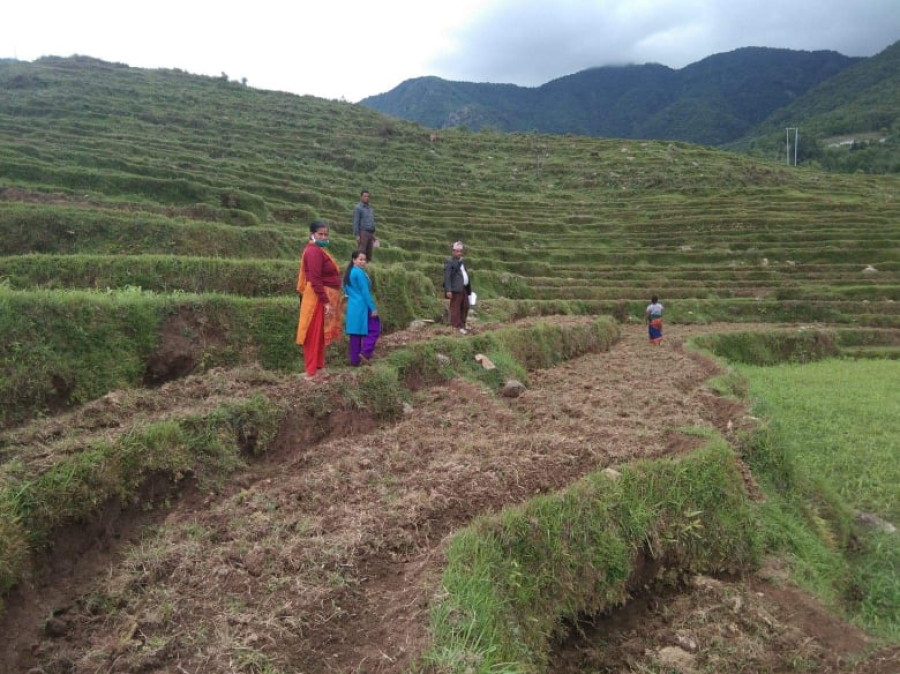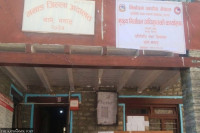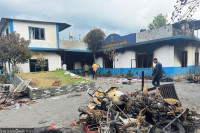Gandaki Province
Agricultural scheme encourages people to take up farming in Syangja’s Phedikhola
The programme was introduced to support jobless people during the Covid-19 lockdown, now the local government plans to continue it.
Pratiksha Kafle
Sita Sunar has been involved in farming since the government enforced a nationwide lockdown to contain the coronavirus spread in March. She and her family members have been growing various food grains and vegetables on 15 ropanies of land leased from neighbours.
Sunar, a resident of Phedikhola Rural Municipality-4 in Syangja district, had to struggle to manage even two squares of meal daily for her family when she used to work as a daily wage worker. These days she earns enough to feed her family of six.
“We were encouraged to get involved in agriculture after the rural municipality decided to provide assistance for growing crops on the land left uncultivated for at least two years. We grow crops and sell in the local market and manage family expenses. I am happy with my decision,” said Sunar, a woman in her early forties.
Sunar does not own land of her own. She and her husband worked as daily wage labourers to support their family before the government enforced the Covid-19 lockdown. The couple were left without jobs during the lockdown.
The farming scheme was a godsend for the couple.
“The rural municipality encouraged us to plant crops on uncultivated land when we badly needed work,” said Sunar.
With an objective to enhance agricultural productivity and employ people who were jobless due to the coronavirus pandemic, Phedikhola Rural Municipality prepared working guidelines to cultivate the land left uncultivated for years.
“The local unit provided assistance to cultivate on around 1,700 ropanies of land since the lockdown. Three hundred and twenty-four people have joined the farming scheme,” said Ghanshyam Subedi, chairman of Phedikhola Rural Municipality.
Those planting crops on their own land get Rs 2,000 per ropani of land from the local government. For those producing crops on leased land, the local government provides Rs 2,500 per ropani of land.
According to Subedi, the programme has mostly attracted local women. Around 200 women are currently involved in farming, thanks to the programme.
The local unit’s policy of providing agricultural assistance has encouraged the local people to grow crops on land left idle for years.
Moti Prasad Paudel of Phedikhola-4 also received Rs 20,000 assistance from the rural municipality and started cultivating on 10 ropanies of land that he owned.
“We had to use our land ourselves. But we left our land uncultivated mainly due to the lack of human resources. The lockdown has been an eyeopener. Moreover, the rural municipality also encouraged us by providing assistance,” said Paudel.
The rural municipality is hopeful that the agricultural assistance policy would also encourage people for commercial farming.
“Paddy, millet and vegetables were grown in the first season. We are now planning to grow vegetables on a large scale and sell the produce in the market,” said Chandrakala Subedi of Phedikhola Ward No 2.
Her family started cultivating on around 10 ropanies of land after receiving agricultural assistance.
The local unit has also managed the market for the agricultural products produced by the farmers.
“The programme has been effective so far. It was initially targeted for unemployed people due to the lockdown and foreign job returnees. With its success, we now plan to continue it,” said Ghanshyam.




 20.52°C Kathmandu
20.52°C Kathmandu.jpg)











